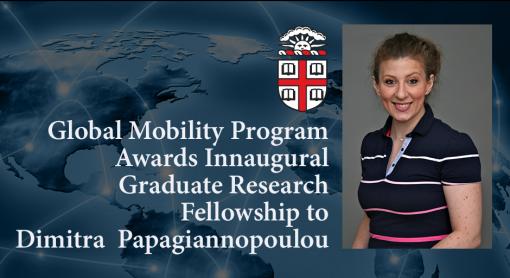 Dimitra Papagiannopoulou, a fifth year doctoral student in the electric sciences and computer engineering group at the Brown University School of Engineering, has been awarded research support from the Office of Global Engagement in the inaugural round of the Global Mobility Program: Graduate Research Fellowship. She is one of nine graduate students at Brown University to be selected for the fellowships. The support will allow her to continue her research on "Exploiting Transactional Memory for Error-Resilient and Energy-Efficient Execution on Embedded Systems" with collaborators in Switzerland during the summer.
Dimitra Papagiannopoulou, a fifth year doctoral student in the electric sciences and computer engineering group at the Brown University School of Engineering, has been awarded research support from the Office of Global Engagement in the inaugural round of the Global Mobility Program: Graduate Research Fellowship. She is one of nine graduate students at Brown University to be selected for the fellowships. The support will allow her to continue her research on "Exploiting Transactional Memory for Error-Resilient and Energy-Efficient Execution on Embedded Systems" with collaborators in Switzerland during the summer.
The grants were created to fund graduate student research abroad that falls under one of the themes highlighted in Building on Distinction, the University's strategic plan. The program also encourages applications from students who are working with current or potential international partner institutions as a way of strengthening Brown's relationship with those institutions. Awards support doctoral-level research abroad for a period of three months during the summer or one academic semester and range from $9,000 for summer research to $13,000 for one academic semester.
During the summer of 2015, she will travel to Zurich, Switzerland to conduct research at the Integrated Systems Laboratory in the Department of Information Technology and Electrical Engineering of the Swiss Federal Institute of Technology Zurich (ETHZ). During this research collaboration, she plans to work on exploiting the capabilities of Transactional Memory in order to achieve error-resilient and energy-efficient execution on Embedded Systems.
This research project aligns with the goal of using science and technology to improve lives. As technology pushes toward smaller circuit dimensions, errors due to variability are becoming an increasing concern, compromising the safety of electronic devices and often resulting in erroneous operation and failures. This research project targets embedded systems that are commonly used in a multitude of everyday life devices from cellphones, cars, medical equipment and appliances to space probes. Erroneous operation of such systems can significantly affect everyday life and in some cases it can even risk human lives. Assuring the robustness of such devices is critical for improving people's quality of living. At the same time, it is important to extend the battery life of embedded devices. Ensuring the error-resiliency and energy-efficiency of such devices is a very challenging task and will be the goal of this project.
This collaborative work with ETHZ started in summer of 2014 and yielded important results that were published in competitive peer-reviewed conferences.